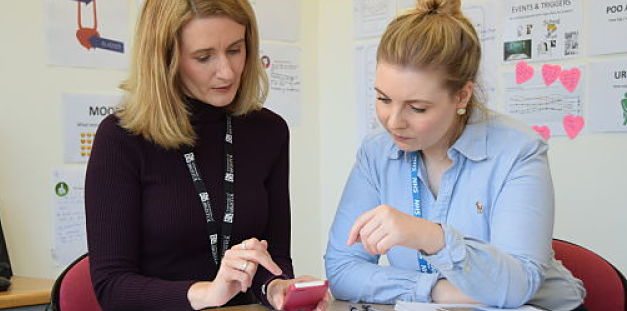Research leads to practical support for young people with continence problems

Bladder and bowel problems are very common and can be affected by psychological issues and stressful life events in a child’s life. There is also strong evidence that bladder and bowel problems affect the mental health of children, young people and their parents.
Dr Carol Joinson is a developmental psychologist in the Bristol Medical School who has conducted research examining how psychological factors are involved in the development of continence problems, and how they in turn affect a child’s mental health.
During 2014-17 Carol led a major research project funded by the Medical Research Council, to examine the risk factors and outcomes associated with continence problems in children and young people. The project used data from the Avon Longitudinal Study of Parents and Children (ALSPAC), but also generated new in-depth qualitative data describing the experiences of young people with continence problems.
Urinary incontinence and urgency problems in adolescence often continue into adulthood and have profound effects on social functioning, educational attainment, and mental health as well as national productivity and NHS spending. Bladder problems, for example, place a significant economic burden on the NHS.
The majority of urinary incontinence problems in young people are functional and highly treatable, but effective treatment requires good adherence and continued support from clinicians. First line treatment for urinary incontinence involves adhering to a regular schedule of toileting and drinking. It can be difficult for young people to stick to treatment, and failure means rising costs to the NHS for incontinence pads, medication, and secondary referrals.
A major finding from this research was that many young people with continence problems do not feel adequately supported by current services and would really like to see improvements in the care they receive.
The research findings prompted Carol to consider a smartphone app to help young people stick to their treatment. With the help of the University’s RED KE team, she started looking for relevant translational funding to enable the development of tangible support that her research had demonstrated was needed.
The University’s Elizabeth Blackwell Institute (EBI) sources funding for health-related translational projects and through them, Carol won Wellcome Trust TRACK funding to take her concept through to a prototype app. A subsequent MRC Confidence In Concept grant, also through EBI, provided an initial evaluation of the app’s usability, acceptability and potential effectiveness.
The result was URApp, designed as a cost-effective, self-management solution for accessible, personalised and effective behaviour change support, including for young people who may not have accessed treatment. The team plan to release URApp to paediatric continence clinics as an adjunct to current treatment.
The MRC project and its reports also showed that many young people with continence problems are not receiving adequate support in secondary schools to allow them to manage their continence problems effectively. Dealing with continence problems at school is difficult, but lack of support and understanding from staff has an adverse effect on young people’s wellbeing and attainment.
School governing bodies have a statutory duty under the Children and Families Act 2014 to ensure schools make arrangements to support pupils with medical conditions. The MRC project findings, key policy implications and recommendations for schools were captured in a Policy Briefing that highlighted to policymakers, including the Department for Education that specific guidance needed to be added to their statutory guidance on ‘Supporting Pupils with Medical Conditions at School’.
In support of this, Carol secured further translational funding from the ESRC Impact Acceleration Account (IAA) to collaborate with ERIC, The Children’s Bowel and Bladder Charity, with young people themselves and secondary school staff: together they produced and promoted information resources for secondary schools. This included a film to teach secondary school staff about the unique needs of young people with continence problems and provide guidance on how to offer support.
This range of translational funding has enabled practical tools to be provided in direct response to some of the needs highlighted by the research. Carol has been very appreciative of the support provided by the University’s RED Research Development, Policy Bristol and Knowledge Exchange teams in securing this, saying “Their [support] included help and guidance at the application stages, ongoing support during the projects and help with translating the key findings to allow stakeholders to make use of the research. I would encourage other researchers who are carrying out translational research to work with the RED team to develop their ideas.”